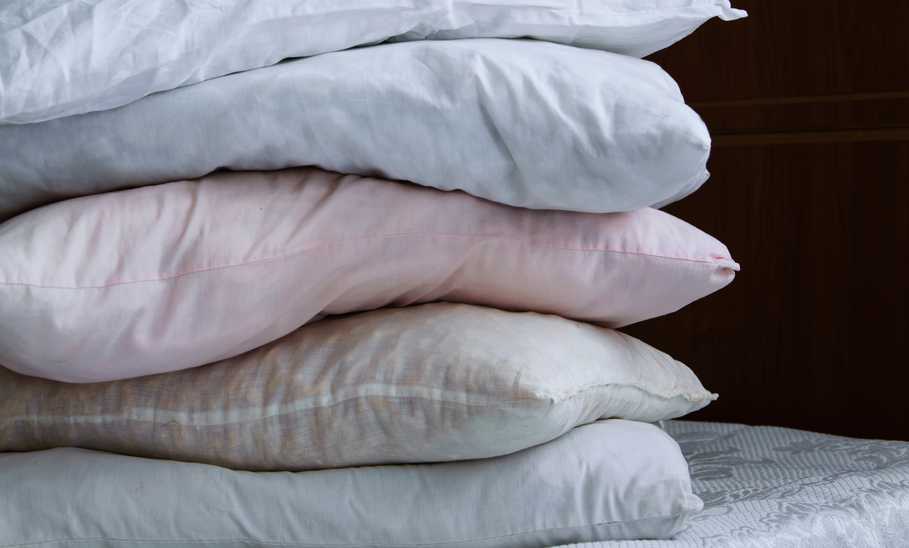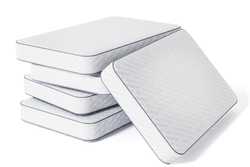How Often Should You Replace Your Pillows?

Our evaluations and opinions are not influenced by our advertising relationships, but we may earn a commission from our partners’ links. This content is created by TIME Stamped, under TIME’s direction and produced in accordance with TIME’s editorial guidelines and overseen by TIME’s editorial staff. Learn more about it.
Where you lay your head at night can seriously influence how well-rested you feel when you wake up in the morning. A comfortable pillow is a key component of a good night’s sleep, and when a pillow gets too old, it may not provide the same level of support you need.
When shopping for new bed pillows, there are many options to choose from, and which one you like best is usually up to an individual’s taste and needs. A good choice will offer support for your neck and shoulders and won’t cause back pain.
Like any other bedding material, pillows do wear out over time. “Just as you periodically evaluate your mattress for comfort and support, you should do the same for your pillow,” shares Mary Helen Rogers, vice president of marketing and communication for the International Sleep Products Association, and member of the Better Sleep Council.
“Most pillows will last an average of two years, but that can depend on multiple external factors,” says Rogers. She adds that your pillow’s lifespan depends on the pillow’s materials, whether or not you use a protective covering over the pillow, and how often you are home sleeping in your bed.
Like all bedding over time, your pillows will eventually succumb to wear and tear, plus stains and smells. In addition, if your pillow becomes misshapen, it can cause neck pain.
Read more: Best Pillows for Neck Pain and a Better Night’s Sleep, According to Experts
“The right pillow is essential to keeping your head/neck/spine in proper alignment as you sleep,” says Rogers. “An old pillow, or even the wrong pillow, can impact how well and how long you sleep at night, and a tired, worn-out pillow no longer provides the appropriate support to your head and neck, impacting your sleep quality.”
| Pillow Type | Care Guidelines |
|---|---|
Memory foam | Spot or hand wash |
Buckwheat pillows | Spot wash and/or hand wash cover only. Air and dry buckwheat filler outside. |
Down | Machine wash on a gentle cycle |
Feather | Machine wash on a gentle cycle |
Microbead and gel (cooling) | Machine wash on a gentle cycle |
*General guidelines are above, but you should always follow the care instructions on your new pillow’s label.
The proper care and maintenance of any pillow will help it to last longer, but some materials have more longevity than others, such as latex or memory foam, similar to mattresses.
Just like quality mattresses, your pillow should not be an afterthought. The pillow and the mattress work together to give you the proper support your body needs. “Rubber and spring pillows do have better performance than feather pillows, but the research is inconclusive on one being more optimal for neck or back pain,” says Staci Hildebrandt, PT, DPT, of OCS ProRehab in Henderson, Kentucky.
The type of fill and material of pillows impact how long they last, and Rogers advises that price shouldn’t be the most important factor when shopping for a new one. Quality pillows should offer support, cooling properties, and a relief of pressure.
Should you buy a particular kind of pillow? Again, more research is required to pick out an objective best option, so Hildebrandt suggests that, “You would just want to find one that provides support and comfort that is specific to the individual.”

You could throw away your pillows, but there are plenty of ways to upcycle them, including using them as a pet bed or knee pad. You could even put a new cover on them and use them in kids' playrooms for extra floor seating. If your pillows are still in good shape and you’re getting an upgrade for cosmetic reasons, you could consider donating them or passing them along, but only if they are in good form and condition.
A pillow protector is a cover that goes on the pillow (it usually zips) to protect it from dust mites, dander, spills, and stains. Some even protect against bed bugs (yuck). Using a pillow protector can help your pillow last longer. If you purchase high-quality and/or expensive pillows, a pillow protector is also one way to protect your investment.
A great pillow can help you fall and stay asleep, and when shopping for replacement pillows, you will find many options, from goose down to memory foam. It’s important to remember that pillows are an important part of sleep hygiene.
The takeaway: A regular audit of your (and your family members') pillows can help you decide if it is time to replace them, but most sleep experts say that new ones should be purchased every couple of years to provide support and comfort.
And don’t skimp when you shop because, “While you can find bed pillows at a variety of price points, you will note that the lower-cost pillows are not going to last as long or be as supportive,” says Rogers. “You should invest in one that feels good and is made of quality materials.”
Read Article: The Best Pillows for All Types of Sleepers
The information presented here is created by TIME Stamped and overseen by TIME editorial staff. To learn more, see our About Us page.



